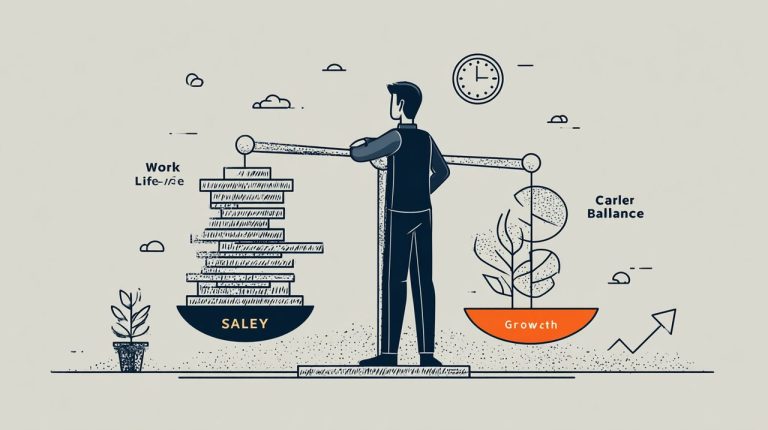The Unspoken Truth: Why Success Can Feel Empty
In a world that often measures professional success by shiny titles, bigger paychecks, and public recognition, there’s a quiet, persistent question many accomplished individuals grapple with:
Why do so many successful people still feel a deep sense of emptiness or dissatisfaction?

This isn’t just a hunch; studies consistently highlight high rates of career burnout and disengagement, even among those who seem to have ‘made it.’ Chasing conventional markers might offer a fleeting thrill, but it often misses a more fundamental human need for meaning and connection.
True career fulfillment, it turns out, isn’t just about what you achieve. It’s profoundly about who you become in the process. It stems from a powerful alignment between your core personal values and your professional journey—a synergy we call LifePath Alignment.
The Paradox of Unfulfilled Success: When Your Career Path Drifts from Your True North
The pull of societal expectations—think prestigious roles, competitive salaries, and rapid promotions—can often steer our career choices. Many of us meticulously climb corporate ladders, build impressive resumes, and earn public praise, only to discover we’re adrift. We might have material wealth, but our emotional bank account feels depleted.
This paradox of unfulfilled success reveals a crucial disconnect. While external validation feels good in the moment, it rarely provides lasting motivation or deep satisfaction. Constantly chasing goals that don’t resonate with your inner compass can lead to chronic stress, disillusionment, and that unsettling feeling of ‘imposter syndrome,’ where even your biggest achievements feel hollow.
This drift from your authentic self isn’t a personal flaw. Instead, it often points to a systemic oversight in how we traditionally think about and navigate our careers.
Unearthing Your Internal Compass: The Foundational Role of Personal Values
Before you embark on any journey, you need to know your destination. In life and career, your personal values serve as your internal compass. They guide your decisions, shape your actions, and define what truly matters to you. These are the non-negotiable principles that provide a sense of purpose and integrity.
Defining Core Values: Beyond the Buzzwords
Core values aren’t just fleeting trends or popular ideas. They are deeply ingrained beliefs that dictate your priorities and how you react to life. Think of them as the fundamental truths about what is good, right, and important to you.
For example, your values might include:
- Integrity
- Creativity
- Community
- Autonomy
- Growth
- Contribution
- Security
These values are the bedrock upon which you build a meaningful life, offering clarity when things get complex.

The Silent Impact of Misaligned Values
When your professional life constantly clashes with these deeply held values, the consequences can be significant. Imagine someone who deeply values creativity and independence, but finds themselves stuck in a rigid, bureaucratic role with no room for new ideas.
Over time, this misalignment often shows up as disengagement, cynicism, and ultimately, burnout. It’s like trying to sail a ship against a strong current; you put in immense effort but make little progress, and the journey becomes utterly exhausting. This internal conflict chips away at your motivation and can lead to a pervasive sense of meaninglessness, even if you’re outwardly successful.
Engineering LifePath Alignment: A Three-Phase Framework for Career Congruence
Achieving LifePath Alignment isn’t a sudden epiphany; it’s a deliberate, step-by-step process. It involves a structured approach to understanding yourself, strategically mapping your path, and continuously integrating your values into your work.
Phase 1: Self-Discovery – Identifying Your Non-Negotiables
The first step is to look deeply within yourself to uncover your authentic core values. This isn’t about what you think you should value, but what truly resonates with you. Here are some ways to do this:
- Reflective journaling: Write about moments when you felt most satisfied and most dissatisfied. What values were honored or violated in those moments?
- Identifying role models: Think about the qualities you admire in others. These often mirror your own aspirational values.
- Prioritization exercises: Use a list of common values to categorize and rank your top 5-7 non-negotiables.
This phase builds the essential foundation, giving you a clear understanding of your internal compass points.
Phase 2: Bridging the Gap – Mapping Values to Professional Opportunities
Once you’ve identified your values, the next step is to translate them into practical career criteria. This involves a strategic mapping process:
- Analyze job roles: Does the work itself align with your values? (e.g., creativity for a designer, service for a non-profit worker).
- Evaluate company culture: Do the organization’s stated and unstated values resonate with yours? (e.g., collaboration, innovation, integrity).
- Consider industry impact: Does the broader industry contribute to something you genuinely care about? (e.g., environmental sustainability, social justice).
This phase is all about actively seeking environments and roles where your values can be expressed and celebrated, rather than suppressed.
Phase 3: Cultivating Congruence – Actionable Steps for Integration
Alignment isn’t just about finding the ‘perfect’ job; it’s about actively shaping your professional experience. Even within your current role, you can foster greater congruence:
- Proactive project selection: Look for assignments that naturally tap into your core values.
- Skill development: Invest in learning skills that support values-driven work.
- Advocacy: Start conversations about how organizational practices could better align with shared values.
- Micro-adjustments: Even small changes in your daily tasks or interactions can significantly boost your sense of alignment.

The Ripple Effect of Alignment: Beyond the Paycheck to Profound Fulfillment
The journey toward LifePath Alignment culminates in a profound transformation. It moves you beyond mere job satisfaction to a deep, lasting sense of fulfillment. It turns work from a chore into a calling, infusing your daily tasks with genuine purpose.
Sustaining Your Aligned Path: Continuous Reflection
LifePath Alignment isn’t a fixed destination; it’s an ongoing journey. Just as you evolve, so too might your values. Regular check-ins and self-assessment are crucial to ensure you stay on course.
- Annual value audits: Periodically revisit and re-evaluate your core values.
- Feedback loops: Pay attention to your feelings of engagement or disengagement as vital indicators of how well you’re aligned.
This continuous reflection allows you to make adaptive course corrections, ensuring your career remains aligned with your evolving self.
The Broader Impact: A Life of Purpose
Beyond your individual well-being, LifePath Alignment creates a powerful ripple effect. When you operate from a place of deep congruence, your work becomes more authentic, impactful, and resilient. You contribute not just your skills, but your whole self, inspiring those around you.
This leads to a life filled with profound purpose, where your professional endeavors seamlessly weave into your personal meaning. It transforms the pursuit of a career into the construction of a truly meaningful legacy.
So, how do we move from the paradox of unfulfilled success to a life of purposeful action? It all begins with one crucial step: understanding and honoring your core values. By systematically integrating these non-negotiables into your professional choices, you can unlock a deep wellspring of intrinsic motivation and enduring satisfaction. This alignment isn’t a luxury; it’s a fundamental requirement for a life truly well-lived.
To kickstart this transformative journey, consider exploring structured self-assessment tools and career development resources, such as our dedicated LifePath Alignment EvaluatorLifePath Alignment Evaluator. This powerful tool can help you shine a light on your unique value system and guide you toward authentic career fulfillment.
💡 Frequently Asked Questions
Many successful people feel empty because chasing conventional markers like titles and paychecks often misses a fundamental human need for meaning and connection. This disconnect between their career path and their core personal values can lead to chronic stress, disillusionment, and a sense of 'imposter syndrome'.
LifePath Alignment is the synergy between your core personal values and your professional journey. It represents a powerful alignment that moves you beyond mere job satisfaction to a deep, lasting sense of fulfillment and purpose.
You can identify your core personal values through self-discovery methods such as reflective journaling about moments of satisfaction or dissatisfaction, identifying qualities you admire in role models, and using prioritization exercises to rank your top 5-7 non-negotiable principles.
Achieving LifePath Alignment transforms work from a chore into a calling, infusing daily tasks with genuine purpose and leading to a profound sense of fulfillment. It also makes your work more authentic, impactful, and contributes to a meaningful legacy.








